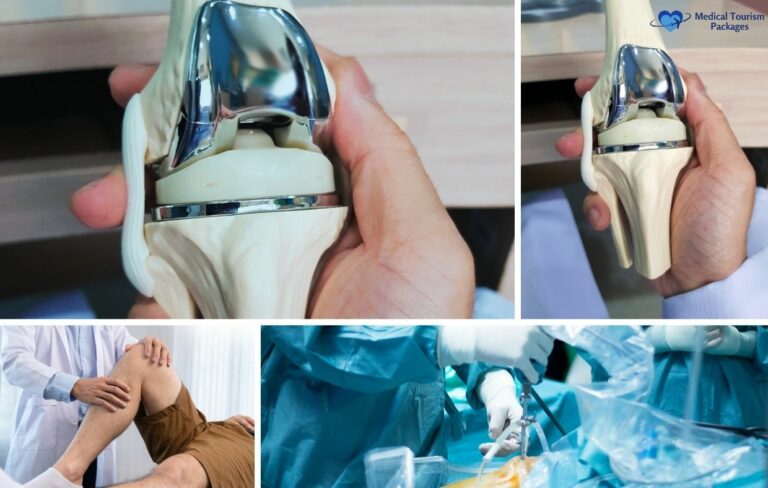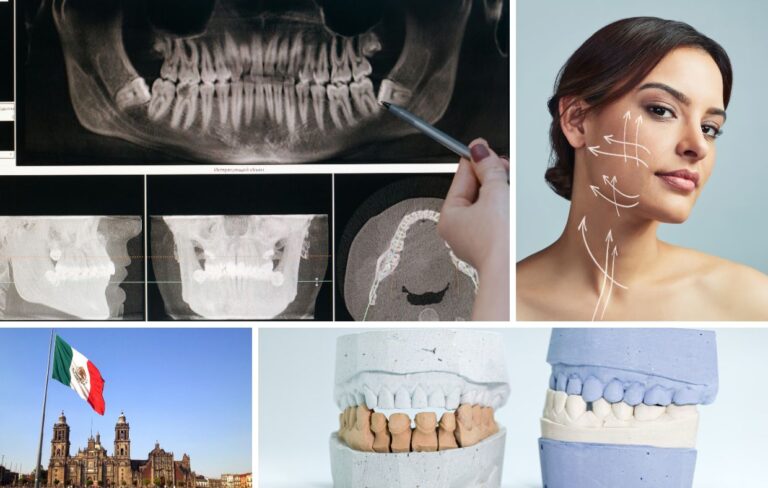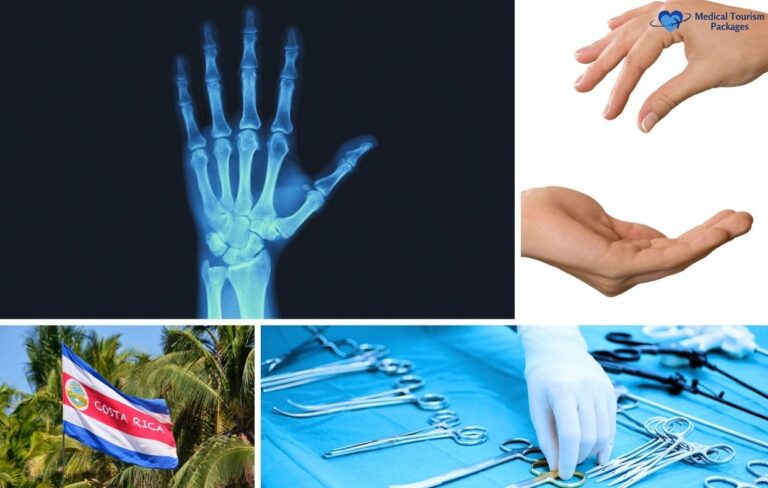Book Appointment Now
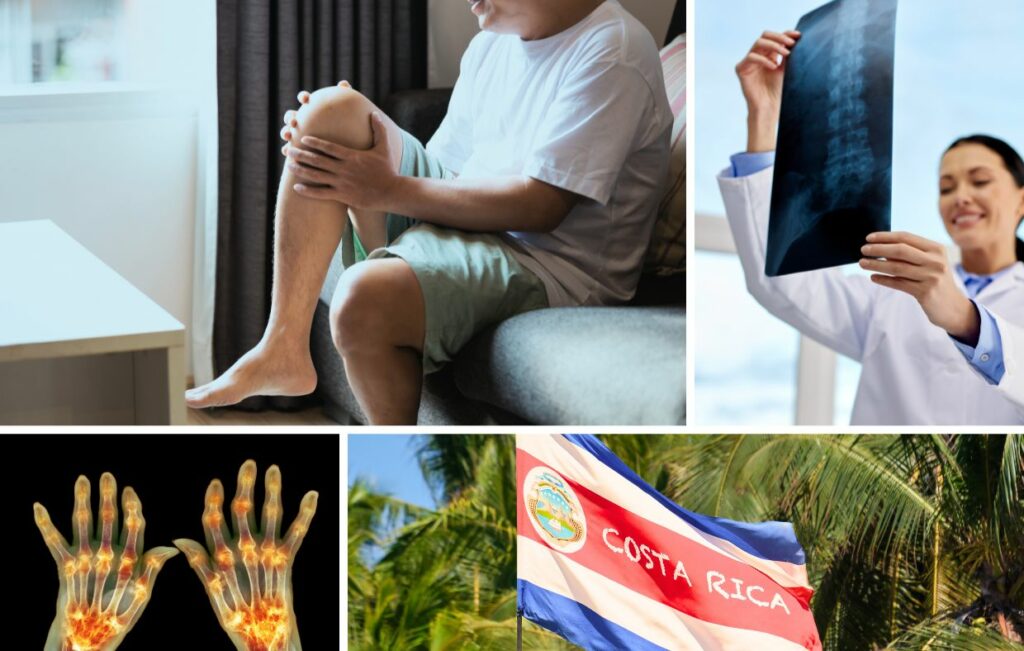
Rheumatology Surgery in Costa Rica: Affordable, World-Class Care
Looking for affordable and world-class rheumatology surgery? Costa Rica is your go-to destination! This Central American gem offers a unique blend of cutting-edge healthcare facilities, highly skilled surgeons with international training, and treatments that are significantly cheaper than in the United States and many European countries.
Whether you’re considering joint replacement, synovectomy, or any other rheumatology surgery, Costa Rica’s healthcare system is equipped to provide high-quality care at a fraction of the cost. With JCI-accredited hospitals and a welcoming environment for international patients, Costa Rica ensures a seamless and comfortable medical journey. Dive into our comprehensive guide to discover why Costa Rica is becoming a hotspot for patients seeking top-notch, affordable rheumatology surgery.
What is Rheumatology Surgery?
Rheumatology surgery is a specialized field that merges the expertise of rheumatology with surgical interventions. These conditions, including rheumatoid arthritis, lupus, and osteoarthritis, primarily affect the joints, muscles, and bones, leading to inflammation, pain, and deformity. While rheumatology traditionally leans towards pharmacological treatments and physical therapies to manage symptoms, certain cases necessitate surgical procedures.
Surgical interventions in rheumatology are designed to restore function, relieve pain, and correct deformities. Among the most common surgeries are joint replacement (hip or knee replacements), synovectomy (removal of inflamed joint lining), and soft tissue repair. The decision to opt for surgery is based on a thorough evaluation, taking into account the severity of symptoms, the patient’s response to other treatments, and their overall health.
Why Consider Costa Rica for Rheumatology Surgery?
Costa Rica has emerged as a leading destination for those seeking affordable rheumatology surgery without compromising on quality of care. This country is acclaimed for its state-of-the-art healthcare facilities comparable to the best in the world. One of the key factors drawing patients to Costa Rica is the affordability of medical procedures, which are 50-70% cheaper than in the United States.
Patients opting for surgery in Costa Rica have access to surgeons with international training and credentials, many of whom hold memberships in prestigious international medical societies. The presence of JCI-accredited hospitals in Costa Rica further assures patients of high standards of medical care available.
Affordable Costs Without Compromising Quality
In Costa Rica, patients can enjoy significant cost savings on rheumatology surgeries, with prices 50-70% cheaper than in the United States. For example, a knee replacement surgery that might cost upwards of $30,000 in the U.S. can be performed in Costa Rica for between $8,000 and $14,900, without sacrificing quality of care or success rates.
State-of-the-Art Healthcare Facilities
Among Costa Rica’s top healthcare facilities for rheumatology surgery are Hospital Clinica Biblica and CIMA Hospital. These hospitals are equipped with the latest in medical technology and are recognized for their advanced surgical capabilities in treating rheumatic conditions. Both facilities hold Joint Commission International (JCI) accreditation, confirming they meet rigorous international standards for patient safety and clinical quality.
Surgeons with International Training
Costa Rican surgeons often receive part of their training abroad, with many having studied or worked in the United States, Canada, and various European nations. Many orthopedic surgeons complete fellowships at renowned medical centers abroad, bringing cutting-edge surgical techniques to their practice in Costa Rica.
What Types of Rheumatology Surgeries Are Available in Costa Rica?
Costa Rica is renowned for offering a comprehensive suite of rheumatology surgeries tailored to combat various conditions that impair joints, muscles, and bones. These surgeries address different stages and types of joint damage, utilizing modern technology and FDA-approved materials.
| Procedure | Recovery Time | Key Benefits |
|---|---|---|
| Joint Replacement | 12 weeks (full recovery 6-12 months) | Restores mobility, eliminates chronic pain, improves quality of life |
| Synovectomy | 3-6 months | Less invasive, reduces inflammation, preserves joint structure |
| Arthroscopic Surgery | 6-8 weeks | Minimally invasive, smaller incisions, faster healing, reduced scarring |
| Soft Tissue Repair | 8-12 weeks | Repairs ligaments and tendons, restores joint stability |
For comprehensive details on each procedure, surgical techniques, and what to expect during your rheumatology surgery, explore our complete rheumatology surgery guide.
What is Joint Replacement Surgery?
In Costa Rica, joint replacement surgeries for hips, knees, and shoulders are highly effective, offering patients significant relief from pain and improved mobility. Total Joint Replacement (TJR) is the cornerstone of surgical rheumatology, particularly effective for joints severely damaged by chronic arthritis. Surgeons remove damaged joint surfaces and replace them with prosthetic components utilizing state-of-the-art prosthetics and innovative surgical techniques. Success rates for these surgeries are notably high, with many patients returning to daily activities with minimal limitations.
What is Arthroscopic Surgery?
Arthroscopic surgery in Costa Rica is a cornerstone for precise diagnosis and treatment of joint conditions. This minimally invasive technique uses small incisions and a specialized camera to diagnose and treat joint problems. Often employed for knee and shoulder issues, it allows for detailed examination and swift correction including meniscal tears, ACL injuries, and rotator cuff repairs. The benefits include reduced recovery times, minimal discomfort, reduced scarring, and less post-operative pain.
What is Soft Tissue Repair?
Costa Rica’s expertise in soft tissue repair encompasses surgeries aimed at repairing damaged tendons and ligaments. These procedures are essential for restoring function and strength, particularly for patients recovering from sports injuries or battling conditions like rheumatoid arthritis. Small joint arthroplasty and fusion address debilitating deformities in hands and feet, restoring function and allowing patients to perform daily tasks comfortably.
How Much Does Rheumatology Surgery Cost in Costa Rica?
Costa Rica stands out as a highly attractive option for medical tourists seeking rheumatology surgeries. The cost of medical procedures in Costa Rica is 50-70% cheaper than what patients typically pay in the United States.
| Procedure | Costa Rica Cost | US Cost | Savings % |
|---|---|---|---|
| Total Knee Replacement | $8,000 – $14,900 | $30,000 – $50,000 | 70% – 75% |
| Total Hip Replacement | $11,500 – $15,000 | $40,364 – $45,000 | 66% – 70% |
| Spinal Fusion (RA-related) | $9,500 – $15,700 | ~$110,000 | Up to 86% |
How Do Costa Rica’s Prices Compare to the US?
In Costa Rica, the cost of rheumatology surgeries is 50-70% cheaper than in the United States, offering significant financial advantage to patients. Total knee replacement costs between $8,000 and $14,900 compared to $30,000 to $50,000 in the U.S., translating to $15,000 to $35,000 in savings. Hip replacements range from $11,500 to $15,000 versus $40,364 to $45,000 in the U.S., saving patients between $25,000 and $30,000.
Is the Quality Comparable Despite Lower Costs?
Despite lower costs, Costa Rica’s healthcare system delivers quality medical care on par with top countries. Patients have access to state-of-the-art facilities and internationally trained surgeons, ensuring the standard of care matches what is available in North America and Europe. This high level of medical service, combined with cost savings, positions Costa Rica as a compelling choice for medical tourists prioritizing both excellence in healthcare and affordability.
How Do You Choose the Right Healthcare Provider in Costa Rica?
When selecting a healthcare provider in Costa Rica for rheumatology surgery, several factors ensure you receive the best possible care. Costa Rica is home to JCI-accredited hospitals known for their adherence to international healthcare standards. These hospitals are equipped with the latest medical technology and staffed by professionals who have received international training.
Which Hospitals in Costa Rica Are JCI-Accredited?
Hospital Clinica Biblica has served patients since 1929, offering comprehensive orthopedic services including joint replacement and specialized procedures for rheumatic conditions. CIMA Hospital is affiliated with Baylor Scott & White Health and features state-of-the-art surgical suites with surgeons trained at leading international institutions. Both hospitals are located in San José, within 30 minutes of Juan Santamaría International Airport.
⚠️ IMPORTANT: Financial Transparency Warning
JCI accreditation ensures clinical structure but does not guarantee ethical business practices. Documented patient experiences indicate high-pressure, non-transparent billing tactics during critical care emergencies at some facilities, resulting in unexpected charges escalating to hundreds of thousands of dollars.
Before traveling, patients must:
- Demand detailed, written contract itemizing all surgical costs
- Require explicit caps for high-cost services like ICU care
- Understand what constitutes an “emergency” and billing changes
- Get all financial agreements in writing before procedure
How Do You Verify Your Surgeon’s Credentials?
Costa Rican surgeons often receive international training, but patients must verify credentials independently. If the surgeon advertises training abroad, confirm their certification status with relevant international boards such as the American Board of Orthopaedic Surgery (ABOS) or the American Board of Medical Specialties (ABMS). The surgeon’s active license and specialty registration must be verified directly with the Colegio de Médicos y Cirujanos de Costa Rica, Costa Rica’s official medical licensing body. Patients should inquire about the surgeon’s volume of specific procedures and their experience managing the unique clinical challenges associated with chronic rheumatic diseases, particularly in immunosuppressed patients.
How Should You Prepare for Surgery in Costa Rica?
Preparing for surgery in Costa Rica involves several key steps to ensure a seamless medical experience. A successful medical tourism experience requires a 90-day minimum planning horizon for surgeon consultations, credential verification, pre-operative testing, and medical record coordination. For a comprehensive planning checklist and step-by-step guidance, see our complete guide for American medical tourists in Costa Rica.
What Visa Requirements Apply to Medical Tourists?
For citizens of most Western nations, entry into Costa Rica for medical purposes requires only standard tourist entry, which permits stays up to 90 days. Essential requirements include passport valid for at least six months beyond departure date, return flight confirmation, and official letter from hospital detailing appointment dates and treating physician.
What Pre-Operative Tests and Medical Records Do You Need?
Pre-Operative Medical Testing
- Complete all testing 30 days before travel
- Blood work (complete blood count, metabolic panel, coagulation studies)
- Electrocardiogram (EKG) to evaluate heart function
- Chest X-ray if required by surgeon
- Final physician clearance confirming fitness for surgery and travel
Medical Records Transfer
- Complete rheumatology history including diagnosis dates
- Current medication list with exact dosages (especially immunosuppressants)
- Recent imaging studies (X-rays, MRI, CT scans)
- Laboratory results from past three months
- Documentation of previous surgeries
- Allergy information and adverse drug reactions
What Can You Expect During Recovery in Costa Rica?
In Costa Rica, the approach to recovery and post-surgery care is meticulously designed to ensure patients undergo comfortable and effective healing. After surgery, patients benefit from inpatient care that prioritizes comfort and provides personalized attention. Healthcare facilities are well-equipped with comprehensive rehabilitation programs aimed at helping patients swiftly regain strength, mobility, and functionality.
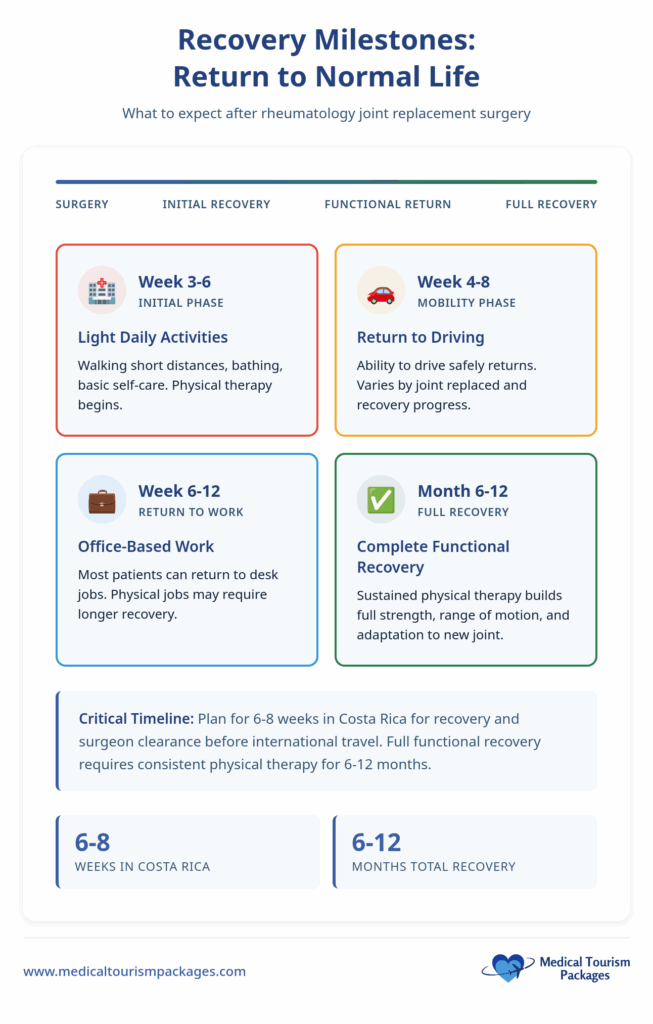
| Procedure | Hospital Stay | Initial Recovery | Full Recovery |
|---|---|---|---|
| Joint Replacement | 1-3 days | 6-8 weeks | 6-12+ months |
| Synovectomy | < 1 day | 2-4 weeks | 3-6 months |
What is Inpatient Care Like in Costa Rica?
Inpatient care in Costa Rica is distinguished by its emphasis on patient comfort, providing a nurturing and supportive environment essential for healing. Physical therapy usually begins one or two days following surgery, with therapists helping you move the operated joint through gentle range-of-motion exercises. For knee or hip replacement, you will practice standing, walking short distances with assistive devices, and navigating stairs.
What Rehabilitation Services Are Available?
Costa Rica offers comprehensive rehabilitation programs integral to the recovery process. Specialized surgical aftercare retreats provide medically supervised recovery tailored to post-operative needs. Budget for minimum of four to six weeks at recovery facility following joint replacement surgery.
Recovery retreats offer:
- 24/7 nursing and medical aftercare
- Medically tailored, anti-inflammatory nutrition
- On-site physical therapy and mobility assistance
- Accessible room design with grab bars and raised toilets
- Medication management coordinated with surgeon
- Transportation to follow-up appointments
Do not schedule return travel until explicitly cleared by your surgeon for flight fitness. Most surgeons require patients to remain in Costa Rica for six to eight weeks after joint replacement surgery. Flying too soon after surgery increases risk of blood clots.
What Are the Success Rates for Rheumatology Surgery in Costa Rica?
While specific, publicly audited success rates for individual Costa Rican orthopedic units are proprietary, the commitment to utilizing modern equipment, adhering to international standards, and employing internationally trained surgeons suggests clinical outcomes that are comparable to those achieved in the US and Europe.
Patients typically resume light daily activities such as walking short distances and bathing within three to six weeks following surgery. Most patients can return to driving within four to eight weeks, depending on which joint was replaced and their individual recovery progress. For those with office-based jobs, return to work typically occurs within six to twelve weeks after joint replacement surgery, though this timeline may vary based on the physical demands of the position and individual healing.
True functional recovery for complex joint replacement requires sustained, consistent physical therapy for six months to one year. During this period, patients continue to build strength, improve range of motion, and adapt to their new joint. Success depends on patient commitment to rehabilitation protocols both in Costa Rica and after returning home.
What Are the Risks of Rheumatology Surgery in Costa Rica?
All surgery carries risks, but rheumatology patients face specific challenges that require careful consideration. A crucial clinical risk for rheumatology patients undergoing total joint replacement is periprosthetic joint infection (PJI). RA patients are often immunosuppressed due to disease treatment, which increases vulnerability to surgical site infections.
Surgical site infections in joint replacement surgeries are catastrophic, requiring extensive revision surgery and prolonged antibiotic therapy. Treatment typically involves removing infected prosthetic joint, placing antibiotic-loaded spacer for six to twelve weeks, administering intravenous antibiotics, implanting new prosthetic joint after infection clears, and extended rehabilitation.
Studies conducted in Latin American hospitals show elevated rates of device-associated healthcare-acquired infections compared to U.S. standards. While facilities meet high standards, the regional environment suggests higher baseline risk for antibiotic resistance, including high levels of Methicillin-Resistant Staphylococcus aureus (MRSA).
Before committing to surgery, ask your surgeon about infection prevention protocols: prophylactic antibiotics used, operating room features, surgical site infection rates, protocols for immunosuppressed patients, and screening for resistant organisms. Discuss with your rheumatologist how long to stop immunosuppressant medications before surgery, when to safely resume them, and signs of infection to watch for.
Can You Combine Surgery with a Wellness Retreat in Costa Rica?
Costa Rica’s physical environment is often cited as a significant contributor to the healing process. The combination of stable, temperate climate and lush natural beauty from tropical forests to mountain views has been shown to reduce psychological stress and accelerate emotional well-being.
Costa Rica’s Central Valley, where most medical facilities are located, maintains spring-like temperatures year-round, averaging 70°F to 80°F with low humidity. This consistent climate eliminates weather-related stress during recovery and allows for gentle outdoor activities as mobility improves.
Specialized retreats integrate holistic recovery principles based on stress reduction, gentle physical activity, and organic clean eating. Stress reduction programs include guided meditation, breathing exercises, and quiet spaces for rest. Gentle physical activity incorporates walking paths, therapeutic pools, and gardens designed for patients with limited mobility. Organic clean eating focuses on anti-inflammatory foods emphasizing fresh fruits, vegetables, lean proteins, and omega-3 fatty acids.
During the first four to six weeks, your primary focus must remain on healing, attending physical therapy, and following medical protocols. After your surgeon clears you for increased activity, you can gradually incorporate light tourism like short visits to nearby gardens with paved paths, scenic drives to accessible viewpoints, or cultural experiences requiring minimal physical exertion.
Is Costa Rica the Right Choice for Your Rheumatology Surgery?
Costa Rica ranks among the top five global choices for patients seeking high-quality, affordable healthcare. The nation demonstrates mature and reliable infrastructure for international patients, with JCI-accredited hospitals, internationally trained surgeons, and specialized recovery facilities. The combination of 66% to 86% cost savings, quality clinical care, and therapeutic recovery environment creates a compelling value proposition.
However, the decision to pursue surgery abroad requires more than comparing prices and reviewing hospital credentials. Due diligence must extend beyond verifying clinical competency to include rigorous scrutiny of financial and legal framework.
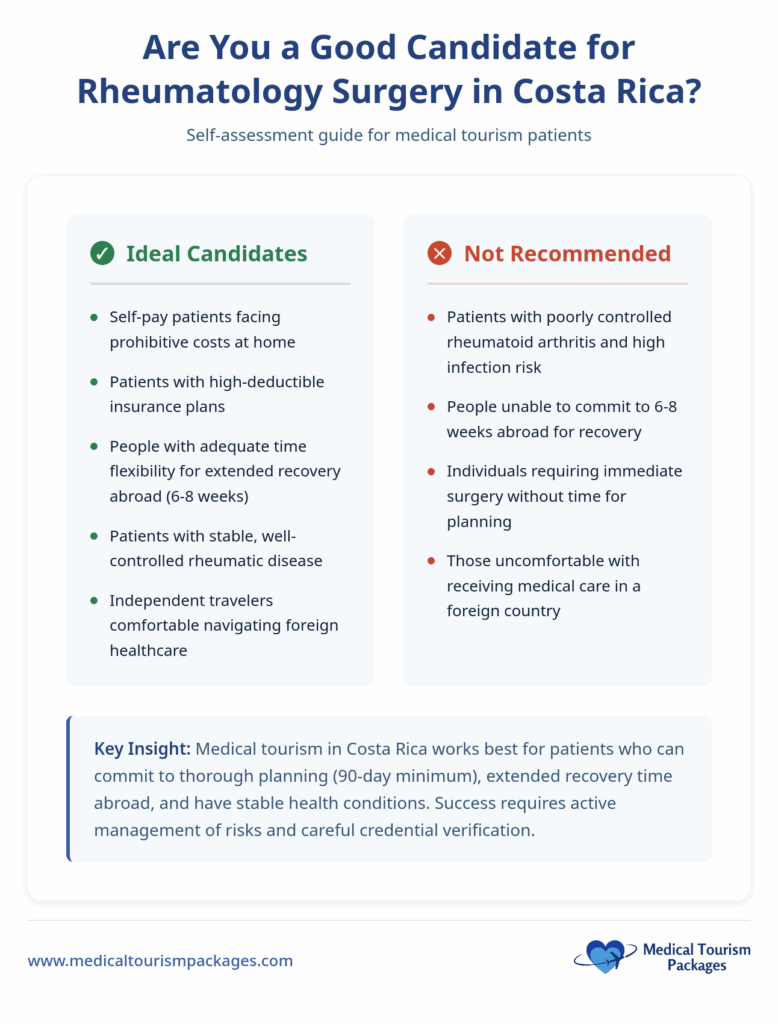
Ideal Candidates:
- Self-pay patients facing prohibitive costs at home
- Patients with high-deductible insurance plans
- People with adequate time flexibility for extended recovery abroad
- Patients with stable, well-controlled rheumatic disease
- Independent travelers comfortable navigating foreign healthcare
Not Recommended For:
- Patients with poorly controlled rheumatoid arthritis and high infection risk
- People unable to commit to six to eight weeks abroad
- Individuals requiring immediate surgery without time for planning
- Those uncomfortable with medical care in foreign country
If you approach this decision methodically, verify all credentials independently, secure comprehensive written contracts, and commit to full recovery process, Costa Rica offers excellent opportunity to access necessary surgery at fraction of U.S. costs. The key is recognizing that success requires active management of risks, not simply assuming international accreditation eliminates all concerns. Take your time with this decision, conduct thorough research, ask difficult questions, and demand documentation.
Frequently Asked Questions About Rheumatology Surgery in Costa Rica
Do I need travel insurance for rheumatology surgery in Costa Rica?
Yes, comprehensive travel insurance with medical coverage is strongly recommended. Standard policies often exclude planned procedures, so purchase specialized medical tourism insurance that covers surgical complications, extended stays, and emergency medical evacuation.
What language do surgeons and medical staff speak in Costa Rican hospitals?
Surgeons and staff at JCI-accredited hospitals commonly speak fluent English, especially those serving international patients. Many physicians trained or completed fellowships in the U.S. or Canada, making communication straightforward throughout care and recovery.
Can I bring a family member or companion to Costa Rica during my surgery?
Yes. Most hospitals and recovery centers welcome companions, and having a caregiver is highly beneficial after joint replacement and other major rheumatology procedures to help with mobility and daily tasks.
What happens if I experience complications after returning home from rheumatology surgery in Costa Rica?
Your Costa Rican surgeon can provide remote follow-up and coordinate with your local physician. Obtain complete surgical records, implant details, and emergency contacts before departure, and set up a follow-up plan with a local orthopedic or rheumatology specialist in advance.
How do I get my medical records and surgical reports from Costa Rica?
You will receive complete medical records, operative notes, and discharge summaries before leaving. Request digital copies along with printed documents, including implant specifications, pathology results (if any), post-op imaging, and translations (English/Spanish) when available.
Will my health insurance cover any costs for rheumatology surgery in Costa Rica?
Most U.S. plans do not cover elective procedures performed abroad. Some policies offer limited out-of-network international benefits, and you may submit claims for partial reimbursement. Confirm your coverage and documentation requirements with your insurer before traveling.
How long should I plan to stay in Costa Rica for pre-op and post-op care?
Most patients arrive 1–3 days before surgery for in-person evaluation and pre-op testing, then remain 7–14 days after surgery for monitoring and early rehabilitation. Your surgeon will tailor the timeline based on procedure type and mobility needs.
Can I complete pre-operative tests at home before traveling?
Yes. Your Costa Rican care team can request labs, EKG, and imaging to be completed locally and reviewed in advance. Share results securely before your trip to avoid delays and ensure surgical readiness.
How is rehabilitation and physical therapy handled after surgery?
Early rehab typically begins in the hospital or recovery center, followed by a home exercise plan and coordinated physical therapy. Your team can refer you to a local therapist at home and conduct telemedicine follow-ups to track progress and adjust your plan.
What payment methods are accepted and how are costs quoted?
Hospitals typically provide a written package quote covering surgeon fees, operating room, anesthesia, implants, and standard inpatient care. Extras may include additional imaging, medications, or extra nights. Common payment options are bank transfer, major credit cards, or cashier’s check, often with a deposit to secure the date.
How Can Medical Tourism Packages Help You Plan Your Surgery?
Medical Tourism Packages specializes in connecting patients with verified, JCI-accredited hospitals and board-certified surgeons throughout Costa Rica. Our experienced team handles every detail of your medical journey, from initial surgeon consultations and credential verification to recovery accommodation coordination and post-operative follow-up appointments, ensuring a seamless, stress-free experience throughout your entire treatment process.
Ready to explore your options for affordable, world-class rheumatology surgery in Costa Rica? Our medical tourism specialists are here to answer your questions, provide detailed cost breakdowns, and connect you with the right healthcare providers for your specific needs. Contact us today to schedule your free consultation and take the first step toward pain-free mobility.

